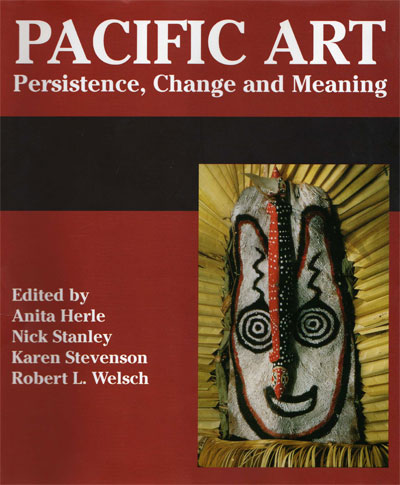Pacific Art Persistence, Change and Meaning
The past quarter century has seen many changes in the ways that
anthropologists and art historians approach the study of Pacific art. No longer do art
historians and anthropologists debate whether Pacific Islands art is really art. Silent is
the debate over whether art means the same things to Islanders as it does to Western
people or whether art serves the same functions in Western and Oceanic societies.
No longer do scholars debate whether anthropologists and art historians should even
bother studying ethnic art, tourist art, and contemporary Pacific Island art. Nearly
everyone interested in art from the Pacific has moved beyond these issues. Instead
during the past twenty-five years there has been a quiet revolution in how indigenous
peoples, art historians, anthropologists, artists, museums, and curators view, analyse,
interpret and understand Pacific art of all kinds.
This collection of essays documents the current state of research about Pacific art as
we enter the 21st century. Many of these authors have conducted intensive field studies.
Many others report on equally intensive archival or museum-based projects. Some of
the more innovative blend fieldwork with museum research. Here these specialists
are writing for a broad general audience. Their contributions are intended to be as
accessible and of interest to students, artists, collectors, and Pacific Islanders as to art
historians, anthropologists, and museum curators.
The essays in this volume set out several key themes that are currently shaping studies
of Pacific art, showing how far our field has come and setting out beacons to point the
way toward where we feel studies of art are heading in the next decade or two. New
approaches in visual anthropology and art history not only take account of the content
or subject matter of visual images and objects, but also investigate the shifting
meanings that objects and images receive in their social production and in their
interpretation by different audiences. Many of these papers are concerned with the
issues of agency and meaning, asking, who are the active parties in the production,
sale, collection and consumption of art? These authors explore the complex relations
among artists, patrons, collectors, and museums over time, as well as the different
meanings given to art objects by each.
While this volume includes a number of detailed historical analyses that pick up on
traditional art-history and anthropological themes, nearly every paper emphasises the
dynamic processes in which Pacific art finds itself. Not only is contemporary art created
amid changing social and political conditions, but older art objects now express new
and changing identities in many Pacific countries. These papers also focus attention on
issues of cultural representation and translation. They document some of the changing
roles of museums and the potential for establishing productive relationships between
museums, curators, researchers and indigenous communities. Several of these essays
demonstrate that older objects long held by museums continue to have an importance
for people in their original communities.
|
|

AUTHOR:
(edited by) Anita Herle, Nick Stanley, Karen Stevenson & Robert L. Welsch
STATUS:
Back List
PRICE:
$69.95
ILLUSTRATIONS:
Approx. 200 images
FORMAT:
Portrait; hardcover; circa 350 pages
DIMENSIONS:
232 x 198 mm
ISBN:
1863332146
|
|

